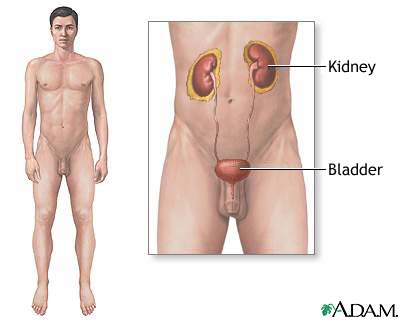Treatment
The primary goals of treatment are to prevent further damage and to treat any existing kidney failure. The health care provider may tell you to stop taking all suspect painkillers, particularly OTC medications.

Signs of kidney failure should be treated as appropriate. This may include diet changes, fluid restriction, dialysis or kidney transplant, or other treatments.
Counseling, behavioral modification, or similar interventions may help you develop alternative methods of controlling chronic pain.
Prognosis (Expectations)
The damage to the kidney may be acute and temporary, or chronic and long term.
Complications
* Acute renal failure
* Chronic renal failure
* Interstitial nephritis
* Renal papillary necrosis (tissue death)
* Urinary tract infections, chronic or recurrent
* Hypertension
* Transitional cell carcinoma of the kidney or ureter
Calling Your Health Care Provider
Call your health care provider if you have signs of this condition, especially if there has been a history of use of painkillers.
Call your health care provider if blood or solid material is present in the urine, or if your urine output decreases.
Analgesic nephropathy: Overview, Causes
Analgesic nephropathy: Symptoms & Signs, Diagnosis & Tests
Analgesic nephropathy: Treatment
Reviewed By : David C. Dugdale, III, MD, Professor of Medicine, Division of General Medicine, Department of Medicine, University of Washington School of Medicine; and James R. Mason, MD, Oncologist, Director, Blood and Marrow Transplantation Program and Stem Cell Processing Lab, Scripps Clinic, Torrey Pines, California. Also reviewed by David Zieve, MD, MHA, Medical Director, A.D.A.M., Inc.
